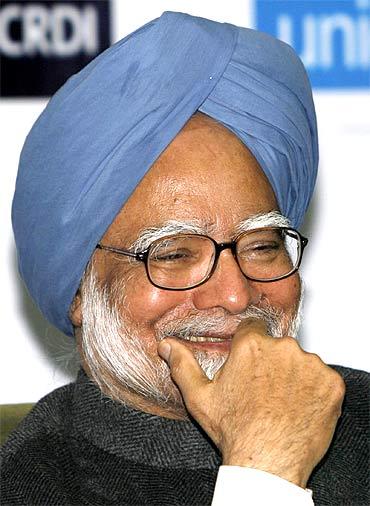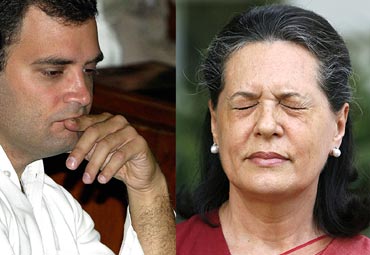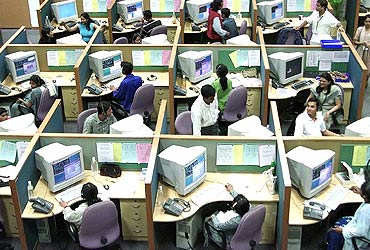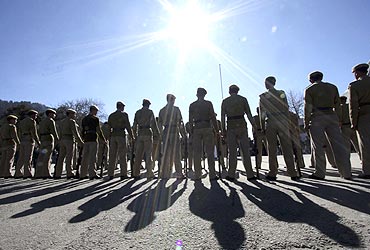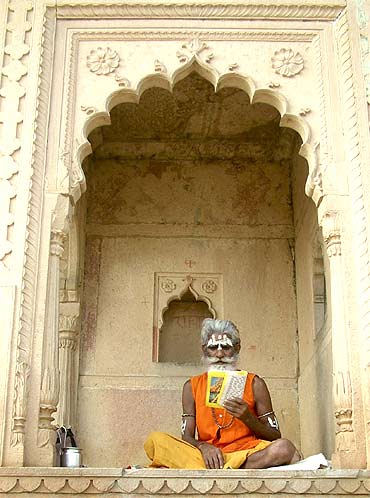 | « Back to article | Print this article |
Army is a positive influence: Survey
The people of India and Pakistan have one thing in common -- they prefer the nation's military to their political leaders.
As many as 92 per cent Indians believe that the military has a good influence on the nation. The defence forces garnered the highest level of support in a survey.
The survey was carried out by the Pew Research Centre, 'a non-partisan fact tank that provides information on the issues, attitudes and trends shaping the world', according to the group's website.
The study was carried out as part of the 2010 Pew Global Attitudes survey.
Click on NEXT to read further...
Most Indians trust Dr Singh
In spite of the massive corruption charges faced by some members of his Cabinet, most Indians still trust Prime Minister Manmohan Singh to manage the country's affairs.
An overwhelming 85 per cent of the people surveyed believe that Dr Singh has a good influence. A higher percentage -- 87 per cent -- of people have a favourable opinion about the prime minister.
Among them, nearly 47 per cent per cent of the respondents held a very favourable opinion about the highly qualified and soft spoken Dr Singh.
Indian media gets the thumbs up
Nearly 85 per cent of Indians believe that the media has a good influence on society.
India prides itself on granting absolute freedom to the press, which is often ruthlessly critical of the government and its policies.
The Indian media, especially the news channels, are sometimes criticised for sensationalising every possible issue.
But the media has time and again proved its mettle by exposing scams involving corrupt politicians and ensuring that the rich and influential don't walk away in spite of committing heinous crimes.
Good news for the UPA
The Congress-led United Progressive Alliance finally has some good news. A surprising 80 per cent of respondents in the survey have given a thumbs up to the national government.
The monumental 2G spectrum scam, the meteoric rise in prices or the embarrassing fiasco over the recently-held Commonwealth Games has not managed to dent the UPA's support base.
If anything, the government has actually become more popular!
In a similar survey conducted by Pew Research Centre in 2007, only 77 per cent people had felt that the government had a good influence.
Confidence in foreign companies has gone up
The Left Front may go blue in the face protesting against divestment and the entry of foreign companies in various sectors of the Indian market.
But the fact remains that most Indians -- 72 per cent of those surveyed -- believe that large companies from other countries have a positive influence.
In a similar survey conducted in 2002, during the Bharatiya Janata Party-led National Democratic Alliance's regime, only 61 per cent people had expressed confidence that large foreign companies had a positive influence.
Most Indians don't trust the police
Not surprisingly, most Indians don't have a very high opinion about their policemen, who are considered to be largely incompetent and indifferent.
Corruption is endemic in the police force, starting from the level of constables and traffic cops and finding its way up to top policemen.
Only 49 per cent of Indians believe that the police force has a positive influence on society, while the majority of 50 per cent feel that its impact is negative.
Indian women have a better opinion about the police -- 55 per cent of them believe that the police have a positive influence. But only 45 per cent of Indian men believe in that.
Not much faith in religious leaders
India is a melting pot of many religions, a country where people from across the world converge to seek out religious gurus and spiritual leaders.
It is, therefore, surprising that only 38 per cent of Indians think religious leaders have a positive influence.
An overwhelming 58 per cent Indians believe that religious leaders actually have a negative influence.
The 2007 survery had revealed that 52 per cent Indians still believed that religious leaders have a positive influence.

